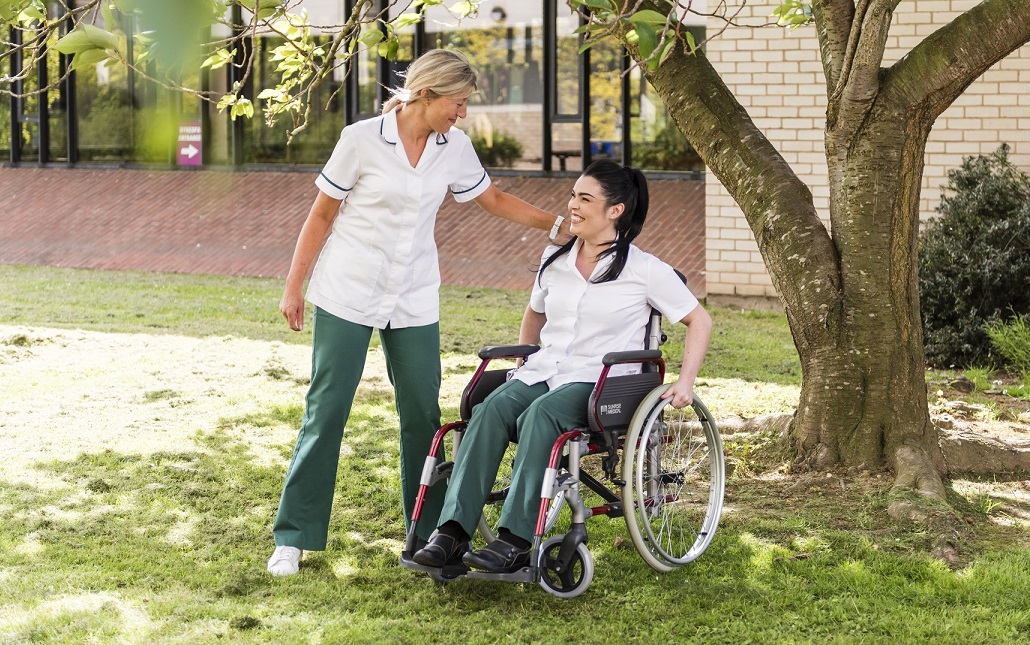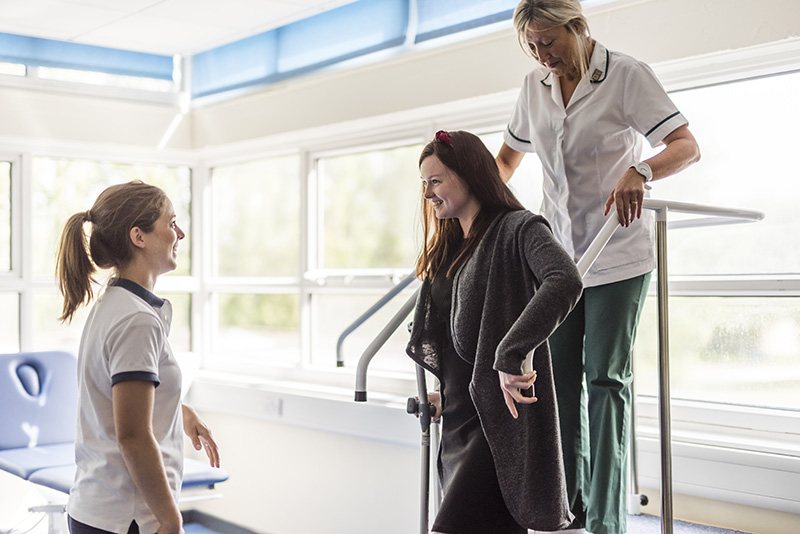BSc (Hons) Occupational Therapy

Course details
UCAS Code
B930
Year of entry
2026
Duration
3 YRS (FT) 4 YRS (PT)
UCAS Tariff
96-112
Institution Code
G53
Location
Wrexham
Why choose this course?
Our accredited Occupational Therapy degree blends academic excellence with practical experience. With small cohorts, students receive personalised attention, enhancing their learning experience.
You will:
- Benefit from a small yearly intake, ensuring a supportive and focused learning environment
- Study a course approved by the Health and Care Professions Council (HCPC) and the Royal College of Occupational Therapists (RCOT), ensuring recognised qualification upon graduation
- Enjoy a wide variety of placements in the local area, further afield and in role emerging settings
- Train in a state-of-the-art simulation suite, equipped for practicing and honing clinical skills in a realistic environment
*This course is part of a subject area ranked Joint 1st in the UK for Graduate Prospects in the Subjects Allied to Medicine subject area league table in the Times and Sunday Times Good University Guide 2026.
*This course is part of a subject area ranked joint 1st in Wales and top 10 in the UK for Graduate Prospects in the Counselling, Psychotherapy and Occupational Therapy subject area league table in the Complete University Guide 2026.

Key course features
- Participate in interprofessional learning, with opportunities to collaborate with other health and related professionals throughout the program.
- As this is a commissioned programme, eligible students (who agree to work in Wales for two years post qualification) can have their fees covered, receive a one-off annual payment, placement cost support and apply for a means-tested bursary as well as student finance.
- Engage in varied assessments designed to suit diverse learning styles and measure a broad range of skills.
- Develop research skills and complete a research project, preparing for evidence-based professional practice.
- Work collaboratively to develop an innovative group product, fostering creativity and teamwork skills.
- Develop both individual and group working abilities, preparing for the diverse demands of professional practice.
What you will study
YEAR 1 (LEVEL 4)
At this level, you will build a strong foundation in occupational therapy principles, focusing on self-awareness, professional ethics, and basic research skills. You'll explore human function through occupation and begin your journey with practical placements to apply theoretical knowledge in real-world settings.
MODULES
- Foundations in Professional Practice 1: This module provides you with an opportunity to gain deeper self-awareness and understand your personal strengths and areas for growth. It emphasises the importance of appreciating and adhering to the expectations surrounding professional ethics, conduct and behaviour within an interprofessional context. As you engage with this module, you will explore the critical importance of cultivating professionalism, resilience, and the ability to reflect on your practice.
- Foundations in Research: This module equips you with the skills to effectively utilise a wide range of resources, including academic literature, journal articles, electronic databases, web-based tools and virtual learning environments to support your academic and professional studies. You will learn to navigate these resources confidently, enhancing your ability to gather, evaluate, and apply information relevant to health and social care. Additionally, you will develop key competencies in independent learning and research-informed academic writing, essential for success in inter-professional practice.
- Human Function Through Occupation: This module enables you to explore and understand how occupational engagement supports normal physical, social and psychological development across the human lifespan. You will study the intricate interplay between biological and psychological systems and their influence on growth and change throughout different life stages. By engaging with this module, you will delve into how meaningful activities and occupations impact well-being and contribute to development in various contexts.
- Foundations in Professional Practice 2: This module provides you with a foundation to understand the theoretical frameworks, occupational science and the philosophy of occupational therapy that form the basis of professional practice. You will explore key concepts that underpin the field, gaining insight into how they guide therapeutic approaches and interventions. You will also be introduced to the occupational therapy process, developing an initial understanding of its stages, principles and application within diverse professional contexts.
- Practice Placement 1: This module helps you consolidate and further develop your skills and understanding of the occupational therapy process, applying them within a practice education setting. Through this placement learning experience, you will build a strong foundation for professional practice by observing and participating in occupational therapy activities. With the close support and guidance of a placement educator, you will gain practical insights into therapeutic approaches, client interactions and the application of theoretical knowledge in diverse settings.
YEAR 2 (LEVEL 5)
This level enhances your understanding of occupational therapy approaches and interventions. You'll delve into evidence-based practice, overcoming occupational barriers, and addressing complex issues in diverse contexts. Practical placements will further develop your skills, preparing you for advanced professional roles.
MODULES
- Developing in Professional Practice: This module deepens your understanding of various approaches to occupational therapy practice and equips you to effectively apply and integrate them into therapeutic interventions. You will critically explore how these approaches align with your professional identity and values as an occupational therapist.
- Evidence in Practice: This module equips you with the skills to gather, critique, analyse and present data in an empirical or literature-based context relevant to contemporary practice. You will explore the value, application, and limitations of research evidence, enhancing your ability to integrate it into professional decision-making.
- Overcoming Occupational Barriers through Intervention: This module provides you with a framework to identify and address the wide range of occupational barriers individuals or communities may face. You will explore these barriers in relation to physical, social, psychological, and environmental factors, considering how they impact participation in meaningful activities.
- Complexity in Practice: This module equips you with the knowledge and skills needed to address occupational issues arising from social and health disparities, diversity and human rights challenges. You will analyse how systemic factors contribute to inequality and explore strategies for promoting sustainable change.
- Practice Placement 2: This module allows you to consolidate and expand your understanding of the occupational therapy process through hands-on application within a practice education setting. During this placement, you will observe and actively participate in real-world occupational therapy interventions, applying theoretical knowledge and developing practical skills. With the close guidance of a practice educator, you will evaluate occupational therapy processes and philosophies in diverse practice contexts.
YEAR 3 (LEVEL 6)
In your final year, you'll focus on compassionate leadership, innovation, and inter-professional relationships. You'll engage in advanced research, evaluate complex practices, and undertake a significant practice placement. This level prepares you for the transition from student to competent, reflective, and innovative practitioner.
MODULES
- Transition into Professional Practice: This module prepares you for your journey into professional practice by fostering your understanding of compassionate leadership and the influence you can have as a graduate health practitioner. You will develop skills and knowledge in driving innovation across local, national, and global contexts, exploring how your contributions can extend beyond clinical expertise to enhance healthcare services.
- Research for Practice: This module equips you with the skills to gather, critique, analyse, and present data in either an empirical or literature-based context, aligning with contemporary occupational therapy practice. You will carry out the research proposed in level 5. You will delve into the value, application, and limitations of research evidence, enhancing your ability to integrate evidence into your professional decision-making.
- Evaluating Complex Practice: This module consolidates your ability to demonstrate the impact of occupational therapy interventions for individuals, groups, and communities experiencing complex occupational barriers. You will explore how to effectively navigate challenging inter-professional environments and address issues within local, national, and global contexts.
- Practice Placement 3: This module provides a comprehensive opportunity to consolidate and expand your skills and understanding of the occupational therapy process in a practical education setting. During this placement, you will take significant steps toward transitioning from a student to a confident and capable practitioner. You will apply theoretical knowledge to real-world scenarios, refine your clinical and professional skills, and gain a deeper understanding of the occupational therapy process. With the support and guidance of a practice educator, you will build independence, enhance your professional identity, and prepare for the responsibilities and challenges of professional practice.
On successful completion of all levels, you will be awarded a BSc (Hons) in Occupational Therapy and will be eligible to apply for registration as an Occupational Therapist with the Health and Care Professions Council.
The information listed in this section is an overview of the academic content of the programme that will take the form of either core or option modules. Modules are designated as core or option in accordance with professional body requirements and internal academic framework review, so may be subject to change.
Entry requirements & applying
To be eligible for this course and bursary under the NHS Wales Bursary Scheme Terms and Conditions, you must be a UK National or Irish National or have been granted Indefinite Leave to Remain in the UK or Ireland.
Overseas applicants without settlement status are not eligible for this course.
Applications for part-time study will open for January 2027 entry on Monday 1st June 2026.
The academic requirements for the course are 96-112 UCAS tariff points at GCE A-level or equivalent. Maths and English/Welsh (First Language) GCSE (at grade C/grade 4 or above) or equivalent are also required.
Applications are welcomed from people who can present evidence of relevant life/work experience. In addition, applicants are expected to demonstrate some insight into the role of occupational therapy.
Applications are considered individually and on merit, however, you must have:
- Recent (last 5 years) A Level or equivalent study (BTEC, Access Course in a relevant subject).
- If you are a school leaver you need a minimum of 112 UCAS tariff points at GCE A Level or equivalent.
- Experience in a range of health/social care/third sector settings whether in a voluntary or paid role.
- Preferably experience with an Occupational Therapist either via shadowing or attendance at Trust taster days or similar careers events.
All post-interview offers of a place on this degree, are conditional to the completion of a Disclosure and Barring Service (DBS) clearance. In addition, any acceptance onto the course is subject to Occupational Health Clearance.
Entry onto the programmes falls at different times of the academic year. Entry to the 3-year full-time programme is in September and entry onto the 4-year part-time programme is in January.
Teaching & Assessment
How you’ll be taught
The course is either a three-year full-time programme or a four-year part-time programme. For full-time students, this would involve three days per week of taught content and then self-directed learning amounting to 35 hours of study per week in total. For part time students, this would involve one day of taught content per week alongside self-directed learning amounting to 18 hours of study per week. At three points in the year, part time students are expected to attend for three days of teaching in a week.
Placements for part-time students are conducted using full time hours.
The course is commended on the high value it attaches to supporting students in their studies and the quality of clinical placements. You will be part of a small cohort of students. The study is a mix of university-based lectures, group work, self-directed study at home and clinical placements with some modules being shared with other AHP lecturers and student groups.
How you’ll be assessed
There are a wide variety of assessments including:
- Academic essays
- Shared group projects
- Case-based viva presentations
- A final year research project on a negotiated topic of your choice
- Poster presentations
- Competencies in practice placements in a wide variety of health and social care settings
We also use simulation of professional practice as a core component of our teaching in our new simulation facilitites and also using our simulation house `Ty Dysgu’ which is located on site.
The course has also formed links with the University of St Augustine's in Florida and this has seen lecturers visit each other’s institutions and take part in teaching. Students from St Augustine's have been to our Wrexham campus for shared sessions and there are plans for Wrexham students to be able to visit Florida. We have also provided live sessions online to the students in the USA and this is a really valuable link in giving students a sense of the global reach of the profession.
This course utilises authentic assessment methods to ensure students can demonstrate the required knowledge and skills to meet HCPC Standards of proficiency upon qualification. For examinations that are assessing a competency required for clinical practice, a reasonable adjustment or alternative method of examination may not be appropriate. This is to replicate the competency and skills that are required for effective clinical practice. If you have any questions about this then please contact the admissions lead or inclusion services to discuss. Information on the required Standards of proficiency upon qualification can be found on the HCPC website Occupational therapists | The HCPC
Teaching and Learning
We offer workshops and support sessions in areas such as academic writing, effective note-making and preparing for assignments.
Students can book appointments with academic skills tutors dedicated to helping deal with the practicalities of university work. Our student support section has more information on the help available.
In terms of particular needs, the University’s Inclusion Services can provide appropriate guidance and support should any students require reasonable adjustments to be made because of a recognised prevailing disability, medical condition, or specific learning difference.
Career prospects
Our dedicated Careers and Employability team is committed to helping you achieve your professional goals. They provide personalised advice, useful resources, and extracurricular employability events to prepare you for the job market.
Graduates of this course can pursue careers in:
- Wide range of NHS services
- Social care
- Third sector organisations
- Private healthcare provision
- Start their own business in independent practice
- Prison services
- Education
- Research
- Social enterprise
- Management roles
Additionally, you may choose to further your expertise through postgraduate studies. Explore our postgraduate courses for more information.
Fees & funding
You do not have to pay your tuition fees upfront.
The fees you pay and the support available will depend on a number of different factors. Full information can be found on our fees & finance pages. You will also find information about what your fees include in the fee FAQs.
All fees are subject to any changes in government policy, view our undergraduate fees.
Accommodation
At Wrexham University, we offer on-campus en-suite rooms within our Wrexham Student Village. These private, fully furnished spaces are conveniently located, providing easy access to campus facilities, study areas, and social spaces. Plus, you’re just a 10-minute walk from the city centre!
With all bills included, free Wi-Fi, 24/7 security, and large social areas, you’ll find everything you need for a great student experience.
Explore our student accommodation options to find your perfect home away from home.
Upcoming Open Days.
Join us at an upcoming open day to meet your lecturers, find out more about our courses, discover our facilities and get a taste of student life.
Browse all of our open days & events.

“The degree is a blend of academic learning, with regular placements which enable you apply your learning in a supportive environment. The variety of placement opportunities from traditional to emerging areas of work gives an insight into areas you may not have considered working in.”
